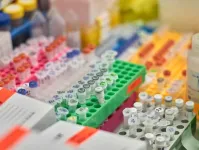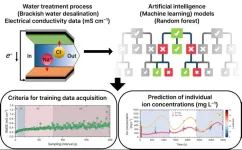New York City (Sep 24, 2024) – Researchers at the Icahn School of Medicine at Mount Sinai have published a pivotal study in Nature Genetics (DOI: 10.1038/s41588-024-01917-1) that sheds light on a novel genetic variant associated with intellectual capacities and educational outcomes. This discovery offers new insights into intellectual disability diagnostics and potential therapeutic avenues.
The study reveals the significant impact of tandem repeats—sequences of DNA where a pattern of nucleotides is repeated multiple times in a head-to-tail manner on a chromosome—on intellectual functioning.
"The genome contains a myriad of these tandem repeats that, when expanded, can disrupt the function of genes,” explained Andrew Sharp, PhD, Professor of Genetics and Genomic Sciences at Icahn Mount Sinai and lead author of the study. “Our research brings to light how these previously underappreciated genetic features can have a profound impact on human intelligence."
Tandem repeats can be compared to sentences within the book of the human genome that are repeated several times. An excessive number of these repeats can lead to a disruption in the genetic instructions, impacting an individual's development and cognitive abilities, say the investigators.
Using advanced DNA methylation profiling and genotyping, the research team identified a repeat expansion of a specific nucleotide sequence, consisting of a series of guanine (G) and cytosine (C) bases followed by another cytosine (C) base (GCC), within the AFF3 gene, which is strongly associated with educational attainment. This discovery could explain the genetic basis of at least 0.3 percent of intellectual disability cases, improving the precision of genetic testing and diagnostics.
The study's phenome-wide association approach, which links genetic variants to human phenotypes, underscores the broader implications of these genetic variations on public health. "Identifying the AFF3expansion as a contributor to intellectual disability is a step toward more accurate and timely diagnoses," noted Dr. Sharp.
Future research is expected to build on these findings. Although the current study focuses on a limited number of tandem repeat expansions, the human genome contains hundreds of thousands, many of which are likely to play a role in disease, explained Dr. Sharp. The team plans to expand their research to explore more of these repeat expansions, deepening our understanding of their prevalence and impact on the human population.
The paper is titled “A phenome-wide association study of methylated GC-rich repeats identifies a GCC repeat expansion in AFF3 as a significant cause of intellectual disability.”
Funding support for this study was provided by National Institutes of Health (NIH) grants AG075051, NS105781, HD103782 and NS120241; NIH National Heart, Lung, and Blood Institute Fellowship 5120339; the Prinses Beatrix Spierfonds (W.OR20-08); the European Research Council under the European Union’s Horizon 202 research and innovation program, grant 772376 – EScORIAL; UK Research and Innovation (MR/S006753/1); Barts Charity (MGU0569); and a Medical Research Council Clinician Scientist Award (MR/S006753/1).
Competing Interest Statement
Pacific Biosciences provided research support for HiFi sequencing performed in this study. Study authors Egor Dolzhenko and Tom Mokveld are employees and shareholders of Pacific Biosciences.
-####-
About the Icahn School of Medicine at Mount Sinai
The Icahn School of Medicine at Mount Sinai is internationally renowned for its outstanding research, educational, and clinical care programs. It is the sole academic partner for the eight- member hospitals* of the Mount Sinai Health System, one of the largest academic health systems in the United States, providing care to a large and diverse patient population.
Ranked 13th nationwide in National Institutes of Health (NIH) funding and among the 99th percentile in research dollars per investigator according to the Association of American Medical Colleges, Icahn Mount Sinai has a talented, productive, and successful faculty. More than 3,000 full-time scientists, educators, and clinicians work within and across 44 academic departments and 36 multidisciplinary institutes, a structure that facilitates tremendous collaboration and synergy. Our emphasis on translational research and therapeutics is evident in such diverse areas as genomics/big data, virology, neuroscience, cardiology, geriatrics, as well as gastrointestinal and liver diseases.
Icahn Mount Sinai offers highly competitive MD, PhD, and Master’s degree programs, with current enrollment of approximately 1,300 students. It has the largest graduate medical education program in the country, with more than 2,000 clinical residents and fellows training throughout the Health System. In addition, more than 550 postdoctoral research fellows are in training within the Health System.
A culture of innovation and discovery permeates every Icahn Mount Sinai program. Mount Sinai’s technology transfer office, one of the largest in the country, partners with faculty and trainees to pursue optimal commercialization of intellectual property to ensure that Mount Sinai discoveries and innovations translate into healthcare products and services that benefit the public.
Icahn Mount Sinai’s commitment to breakthrough science and clinical care is enhanced by academic affiliations that supplement and complement the School’s programs.
Through the Mount Sinai Innovation Partners (MSIP), the Health System facilitates the real-world application and commercialization of medical breakthroughs made at Mount Sinai. Additionally, MSIP develops research partnerships with industry leaders such as Merck & Co., AstraZeneca, Novo Nordisk, and others.
The Icahn School of Medicine at Mount Sinai is located in New York City on the border between the Upper East Side and East Harlem, and classroom teaching takes place on a campus facing Central Park. Icahn Mount Sinai’s location offers many opportunities to interact with and care for diverse communities. Learning extends well beyond the borders of our physical campus, to the eight hospitals of the Mount Sinai Health System, our academic affiliates, and globally.
-------------------------------------------------------
* Mount Sinai Health System member hospitals: The Mount Sinai Hospital; Mount Sinai Beth Israel; Mount Sinai Brooklyn; Mount Sinai Morningside; Mount Sinai Queens; Mount Sinai South Nassau; Mount Sinai West; and New York Eye and Ear Infirmary of Mount Sinai.
END



